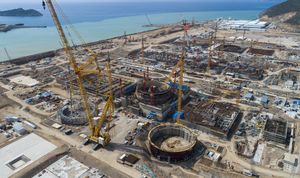German markets experienced significant movement following the recent victory of the conservative bloc led by Friedrich Merz in the national elections, with reactions felt across Europe.
The CDU/CSU coalition secured 28.5% of the votes, defeating the far-right Alternative für Deutschland (AfD), which managed to garner 20.5% of the votes. Coming after weeks of speculation, the election results were largely expected, allowing investors to breathe a sigh of relief and resulting in positive market responses.
According to Xavier Chapard of LBP AM, "The preliminary results of the German federal elections are largely in line with expectations, which reassures the markets this morning." Following the announcement, the Euro strengthened to $1.05245, reflecting optimism about the future administration.
Despite the CDU/CSU's success, the lack of majority leadership indicates lengthy coalition negotiations lie ahead. Charu Chanana from Saxo Bank noted, “The dynamics of the coalition remain uncertain, which suggests political fragmentation may lead to political paralysis.” This uncertainty surrounding coalition formation dampens what could have been immediate policy shifts for Germany.
While immediate reactions on the stock market were positive, reflecting gains across major European indices, including the EUROSTOXX 50 and the DAX, analysts have cautioned about the potential roadblocks the new government may encounter. Germany’s economy, which contracted for the second consecutive year, poses significant challenges for Merz’s administration, particularly concerning urgent reforms.
Market experts are closely monitoring the newly elected government's approach to military spending and overall EU strategic defense policy, especially against the backdrop of the current situation in Ukraine. Chapard predicts changes will depend on how quickly the coalition can maneuver necessary economic reforms, stating, “Short-term, the market will react to the likelihood of declining energy prices and the pace and magnitude of increased military spending.”
The outcome of these elections is pivotal not only for Germany but also for the broader European political and economic theatre. There are expectations of enhanced military negotiations among European countries, primarily as they assess their positions and readiness amid rising geopolitical tensions.
Investors are also reflecting on the extensive pressure placed on current budgets and aid systems, particularly with regards to the military, with many European nations scrambling to shore up defenses due to external threats. Observers are contemplating the extent to which the new government will revise the existing debt brake limiting structural budget deficits, with the question remaining of how spending priorities may evolve.
Natixis strategists warn about the looming challenges the next German government will face, emphasizing the dire state of the German economy. "The challenges for the next German government are colossal as the German GDP is back to its 2018 levels," they stated. This stark reality highlights the imperative for intensive policy reforms to stimulate growth.
This outcome sets the stage for potentially significant shifts within the EU, especially concerning defense initiatives and financial commitments. Investors are awaiting upcoming economic indicators and data releases, including inflation rates and manufacturing indices, which will provide insights post-election on how the market adjusts to these political developments.
Overall, there is cautious optimism as the CDU is likely to lead Germany along market-friendly lines, promoting policies favorable to business and investment. The combined influences of market stability following these elections and the urgency stemming from external pressures may compel the new administration to pursue reform-oriented agendas swiftly.
With all factors considered, the ramifications of the recent elections extend well beyond national borders, contributing to the shaping of economic and defense landscapes across Europe as nations navigate the complex post-election reality.



